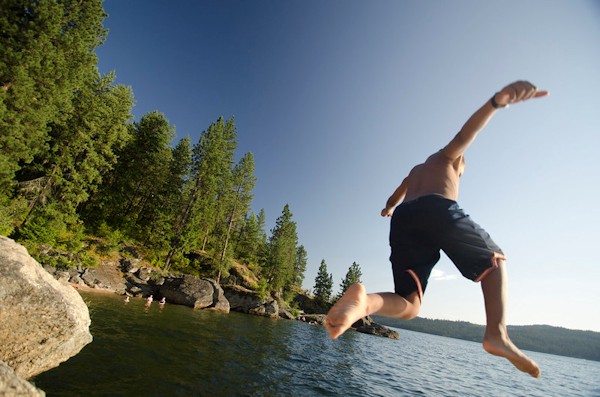
Most of us enjoy our time outdoors. If we have followed the Zeitgeist long enough, we were afraid there aren’t enough people out there (Nature Deficit), then there were too many people out there (Covid).. but today the Society for Environmental Journalists came up with these for story ideas; maybe these stories will help reduce overcrowding.. or cause generalized depression.. or both. Note that flesh-eating bacteria have not been linked to climate change, nor sewage overflows.
For environmental journalists, summer is sort of like Mardi Gras and Christmas combined. At least it used to be, before it became an occupational hazard and a meme at the same time. In fact, it’s the hottest summer so far in human history. And yes, there will be worse-than-ever hurricanes and wildfires.
So no, summer isn’t what it used to be.
Historically, it was the time for having fun outdoors. In some beleaguered states, the outdoor recreation industry was as profitable as the oil and gas industry. The Commerce Department says it is worth $563.7 billion or more annually.
That means if you are looking for story ideas, you should consider the impact of climate change on your local outdoor recreation industries. Here are some possibilities for your reporting.
Summer festivals: Nowadays, thanks to warming weather, many of the biggest summer music festivals in the United States, like Bonnaroo and Lollapalooza don’t happen later than May or early June (last summer in the Southern Hemisphere — November to the rest of us — a fan at a Taylor Swift concert actually died of heat illness). But there are still so many lesser festivals going on across the country (maybe near you) in the hottest part of summer. This year, the Chincoteague wild pony roundup starts July 20. How are your local festivals adapting?
Summer camps: Those of us who are working parents often send our kids to summer camp, even if it’s just an outdoorsy kind of babysitting. Except the heat may be so bad that it needs to be indoorsy. How are summer camps (whether day camps or away camps) in your area adapting to the latest heat wave?
Fishing: People in many parts of the United States spend time during their lazy days fishing. But the fish aren’t always happy about the heat. Trout, salmon and some other species don’t want to live in hot water. Drought, common during summer in many parts of North America, may reduce streams to a trickle. Check in with local tackle shops to get insight. Also, are your fishing waters more polluted in the summer?
Hiking: Because summer is when many people have the time, they want a walk in the outdoors. This can be perilous during extreme heat. Hikers need to understand the risks and to adapt and plan accordingly. Visit trailheads for both longer routes (like the Appalachian Trail) and shorter local day hikes and talk to hikers both before they go out and return.
Swimming: People swim to cool off. Many seek out nonchlorinated waters like those at a beach or lake. But the opportunities for serious water pollution and hazards often increase during the hot summer weather. There are sewage overflows, stormwater events, algal blooms, vibrio (cholera-like) outbreaks, jellyfish and all kinds of other health threats — not to mention the flesh-eating bacteria. Talk to the lifeguards, if any.
Canoeing, rafting and tubing: Depending on the water and vehicle, these trips can last for a few minutes or a few days. Even though people think they won’t be going swimming, they usually do. It can be a good way to cool off in hot weather, but the hazards of heat and polluted water may remain. Check in with the guides and outfitters who support these activities.
Picnics, cookouts and barbecues: When it’s Fourth of July, a cookout may be mandatory rather than optional. No matter how hot it is. But there is that old saw about leaving potato salad out in the hot sun (it will spoil slower if you skip mayonnaise). Go to a park where people picnic. Ask them about their extreme heat experience.
County and state fairs: You probably have both, probably in the later, hotter weeks of summer. Fairs are fun — but the extreme heat can be a health threat for vulnerable people. Visit your fairgrounds and talk to people about their heat experiences. Is it cooler atop the Ferris wheel? Hydrate.